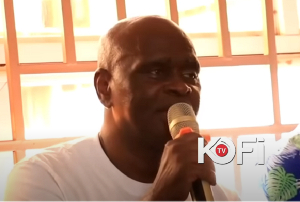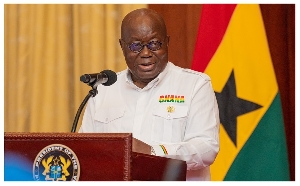Opinions of Saturday, 5 January 2008
Columnist: Akosah-Sarpong, Kofi
Elites, Tradition, Mixing and Development
The increasing understanding that Ghanaian traditional values should also inform the Ghana development project as have been Western historical experiences and paradigms is captured in City University of New York’s Steve Panford’s “Searching for Transformational Elites in Ghanaian Development” (Ghanaweb.com, 2007-12-12).
But the degree at which Ghana progresses is immensely informed by the nature of elites and how firm their grasp of traditional values is as fodder for progress - here Panford makes the case for “transformative elites” as the key directors of progress.
Global or local, Panford’s opinion that national progress rests on the level of sophistication of its leadership is unarguable. But what is arguable is how the national leadership and major actors (here including international development agents and donors) have a thorough grasp of their environment (that’s cultural norms, values and traditions) and their ability to skillfully weave such knowledge and understanding into the global prosperity domain. The key light here is the ability of the major development actors and leadership - particularly policy-makers and bureaucrats - to mix their history and indigenous culture with global development values. Rightly, Panford points to two African states which have been able to do so successfully with wisdom and humility - Botswana and Mauritius.
In Panford, we see how Ghana, the first African nation to gain independence from colonial rule from Britain in 1957 and which prides itself as the “Black Star of Africa,” has not radiated Botswana’s developmental wisdom and humility which got independence from British colonial rule in 1966. With its humble elites displaying a dazzling array of developmental insights, Botswana, like most of the Southeast Asian and Latin American countries, have been able to mix its traditional values with the dominant global development ones.
In “The Political Foundations of Development: The Case of Botswana,” Scott A. Beaulier and J. Robert Subrick explain that compared to most sub-Saharan states, Botswana has not only steered clear of the “African Growth Tragedy” but has successfully implemented growth-enhancing policies that are driven by its elites’ ability to mix its “traditional sources of authority” with its ex-colonial and the global prosperity values.
Thinking broadly, Panford’s development premise, whether seen from Ghana or Botswana or any other country in the world, is the ability of each particular elite to skillfully appropriate from the global neo-liberal development values and mix them with their local traditional values for progress, as Botswana has demonstrated. In studies of the global development literature, as Panford argues, whether “as advocated by Marx, Weber, Schumpeter, Hagen, Rostow, Frank, Fanon, Amin, and Stiglitz,” what explodes constantly is how enlightened a state’s elites are in playing with both the local and global development values for progress. And the key thinking is “transformative elites,” not only as directors of progress but also as demonstrators of local cultural values and the global prosperity game driven by enormous can-do, positive development action.
Whether in Malaysia’s Mahathir Mohamad or Japan’s Akio Morita or South Korea’s Gen. Park Chung Hee or Taiwan’s Gen. Chiang Kai-shek or Singapore’s Lee Kuan Yew or China’s Deng Xiaoping, we see Panford’s transformational elites as directors of progress who have a vast grasp of their traditional cultural values and global prosperity ideals. No doubt, despite some rifts between tradition and capitalism in the Asians’ march to prosperity in 1949, as Daniel Yergin and Joseph Stanislaw argue in “The Commanding Height,” “the Asian miracle is now sometimes called “Confucian capitalism,” a reminder of their elites’ ability to play with their traditional values and the neo-liberal development paradigms.
Botswana aside, Panford asks painfully, “why” have elites in Ghana and other African states “abandoned this important role when it comes to the societies of Africa?” Still, Botswana aside, the issue isn’t Ghana and Africa does not have any history or cultural values as a base leading to the global level - they have.
As Panford rightly explains, “Historically, this was not the case. In pre-colonial Africa some of the elite comprising of the kings, chiefs, entrepreneurs, priests, warriors and scholars played significant transformative roles. That group helped to found and build the empires of Egypt, Zulu, Yoruba, Ghana, Mali, Songhai, Asante and Ethiopia among others. Most of these societies developed sophisticated legal, economic, social and political institutions, which provided the framework for developing functional and stable societies.” While Botswana have been able to draw from its traditional institutions and mix them with the dominant neo-liberal development values for prosperity in the last 20 years, Ghana and other sub-Saharan states have not been able to do that, with most of their educated people not able to think through their traditional values in their development processes.
As much as everyone knows, Panford puts the blame on Ghana’s education system, which, for long, has been heavily un-reflective of the very Ghanaian environment and history and, in a comical way, still produce elites ”educated within the European value system and well anchored in Western ideals” who “saw their mission rather differently.” The disturbing result is Ghanaian elites who are not only confused in the larger progress of Ghana but a reasonable number demeaning the very foundational cultural values of their society in their attempts to progress.
The Ghanaian development “tragedy,” as Panford argues, isn’t only its elites working against the national interest but violating Ghanaian cultural norms, as Maxwell Owusu, of the University of Michigan would say. “In reality, their personal interests become the national interest! They use their domination of the major institutions of society and government, - executive, judiciary, legislative and media - to advance their parochial interests.” The inner thinking here is that in its 15-year-old emerging liberal democracy or growth of civil society or policy-making and bureaucratic practices, Ghana, as a development project, isn’t driven by its cultural values, as Botswana and Southeast Asian states have constructively demonstrated. Panford quotes an Africa observer who questions “whether the “self-interested elites [of Africa are] the curse of liberal democracy [and development] in Africa?” Panford’s argument reveals that, from pre-colonial struggles for independence to post-colonial campaigns for democracy, nationalism has been the main motor. But from Kwame Nkrumah to Kofi Busia to Hilla Limman to Jerry Rawlings, such nationalisms have not demonstrated remarkable grasp and understanding of Ghanaian cultural values as bulwarks for progress in relation to the global development process as Botswana and Southeast Asian states have shown. Still, in their heated nationalistic agitations for freedom and democracy over the years, Ghanaian elites have fallen short of Panford’s transformational ethos, simply because they haven’t worked hard and humbly enough to think through the Ghanaian development process from within their traditional cultural values up to the global prosperity level, once again, as Botswana and Southeast Asian countries have done.
It is from a firm grasp of indigenous knowledge and understanding, as Ghana’s development and democracy grow, that Panford’s “emergence of a “new” nationalistic and a developmentally oriented elite” will be given birth.
Entertainment












